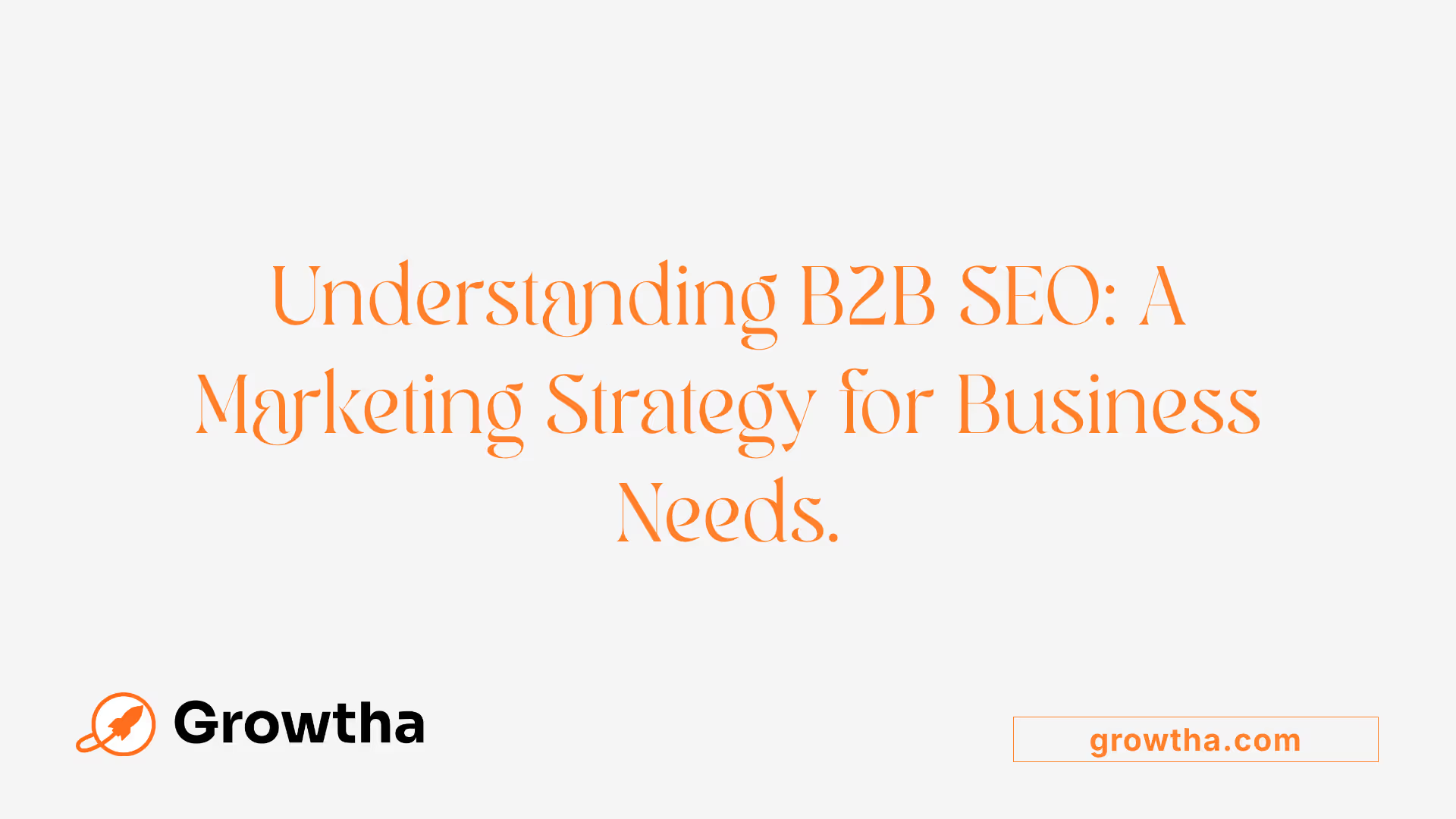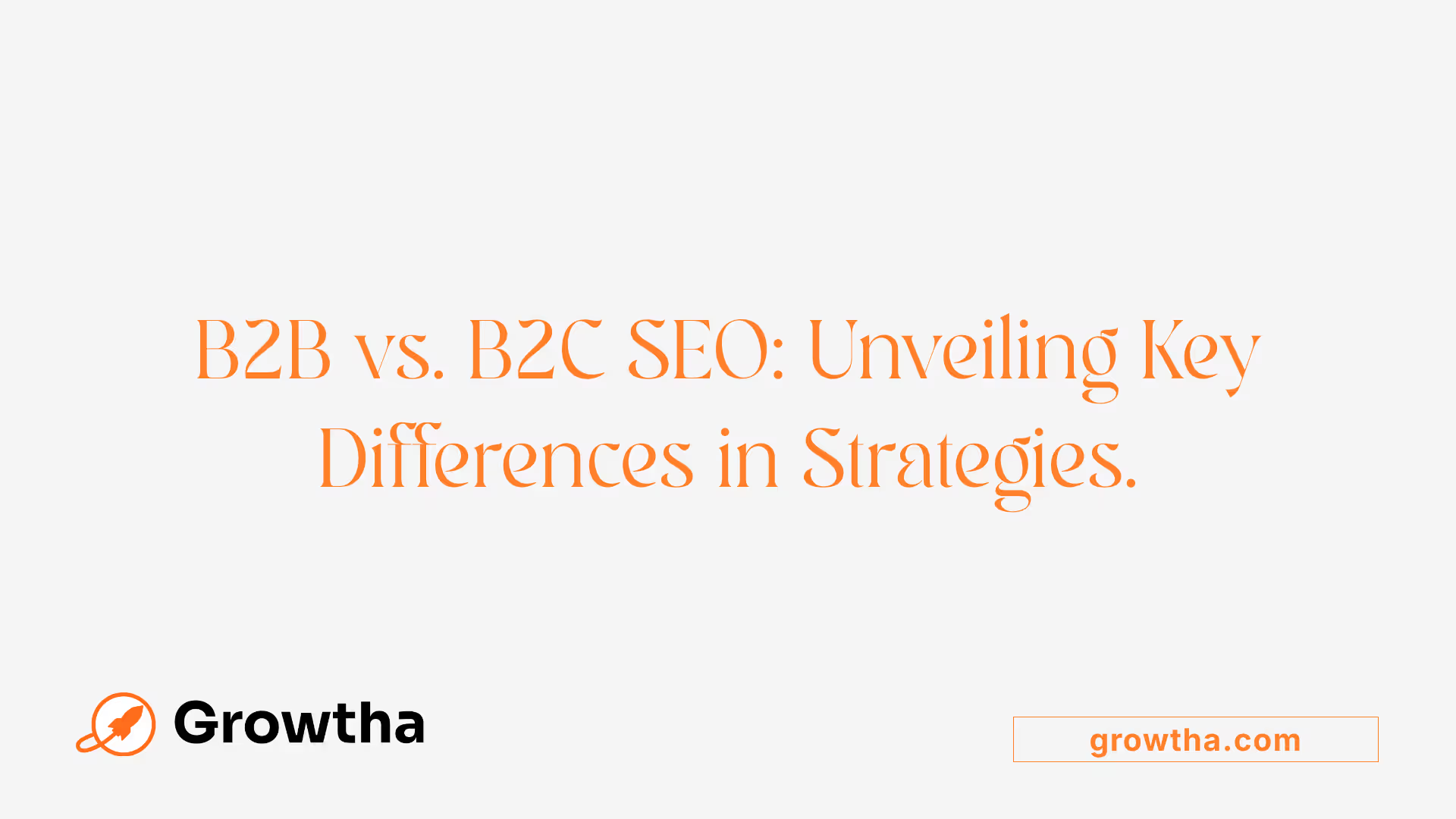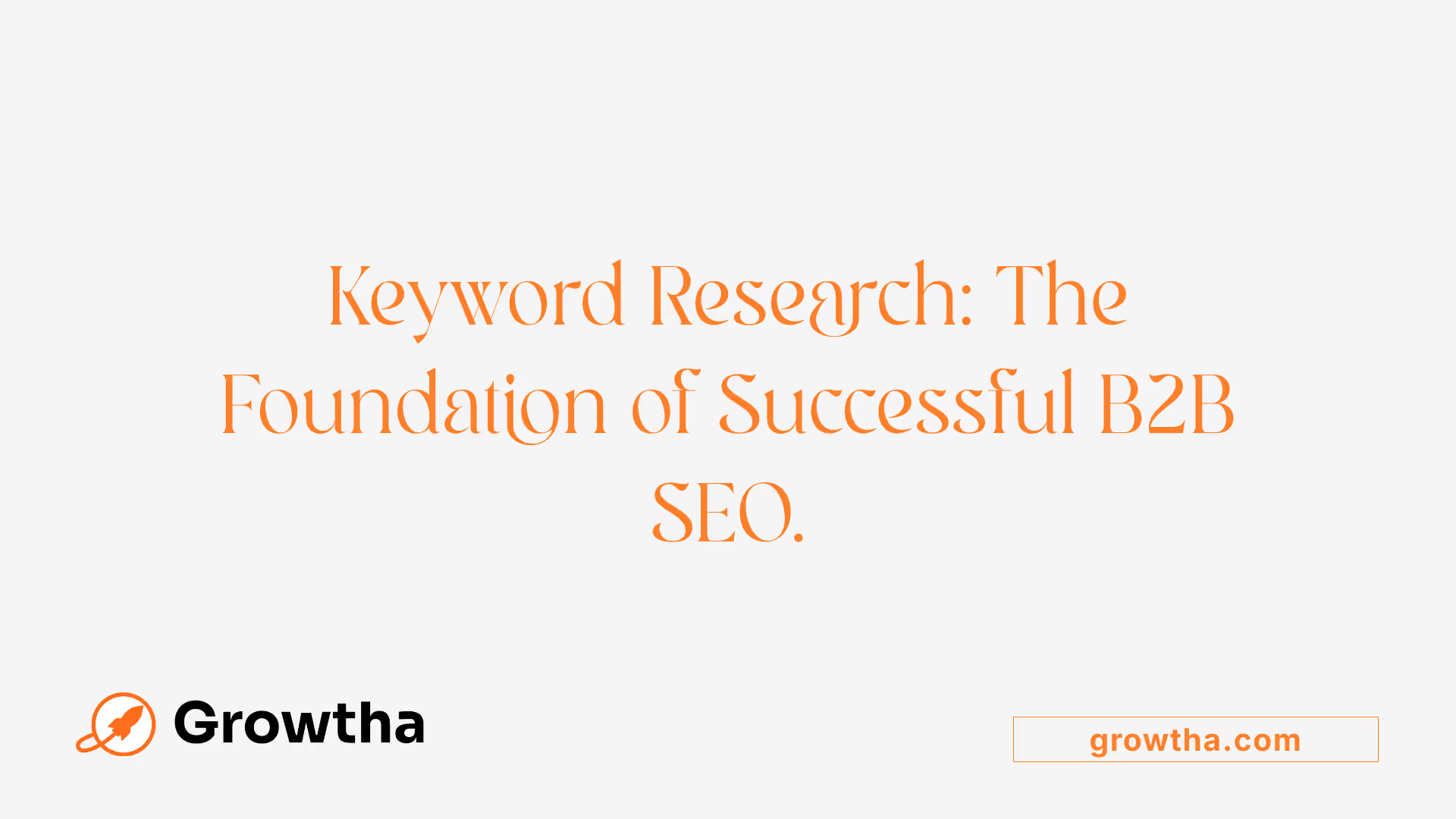B2B SEO
Business-to-business (B2B) SEO is a marketing strategy designed to increase organic search engine traffic and improve keyword rankings for B2B websites.


B2B SEO
Mastering B2B SEO for 2024: Strategies and Insights
Understanding B2B SEO
In the world of digital marketing, B2B SEO stands out as a crucial strategy for enhancing online visibility and lead generation for businesses targeting other businesses. As we move into 2024, understanding the nuances and strategies that make B2B SEO effective is more important than ever. This article delves into the intricacies of B2B SEO, exploring how it differs from B2C, the latest trends, and actionable strategies for success.
What is B2B SEO?

What is B2B SEO?
Business-to-business (B2B) SEO is a marketing strategy designed to increase organic search engine traffic and improve keyword rankings for B2B websites. Unlike traditional SEO, B2B SEO targets potential customers who are actively searching for specific products and services relevant to their business needs. This strategy often involves utilizing low-volume keywords that cater to a more niche audience, which helps in effectively engaging decision-makers such as CEOs and marketing managers.
B2B sales funnels are typically more complex, involving multiple stakeholders in the process, which emphasizes the need for detailed buyer personas and precise keyword research. For instance, a well-crafted SEO strategy not only focuses on increasing visibility but also strategically influences buyer behavior—key for capitalizing on longer purchase cycles prevalent in B2B transactions. Content marketing is crucial in this sphere, serving to establish thought leadership through high-quality content such as blogs, case studies, and engaging social media posts. Moreover, the imperative for optimizing on-page elements like meta descriptions and header tags cannot be overstated, as these contribute significantly to search engine ranking.
Why is B2B SEO Important?
The role of B2B SEO in digital marketing cannot be underestimated. Businesses have reported that SEO generates higher quality leads than other marketing channels, underlining its effectiveness in reaching potential clients precisely when they are in need of solutions. Furthermore, with over 80% of B2B companies affirming the lead-generating power of SEO, not only is the strategy desirable for enhancing visibility, but it also becomes a critical component of the sales process. In a world where 90% of B2B researchers indicate that search is their primary tool for researching business purchases, having a robust B2B SEO strategy ensures that organizations don’t just compete for attention but strategically position themselves as credible sources of business solutions.
What Challenges Exist in B2B SEO?
The complexities of B2B sales funnels present unique challenges for SEO practitioners. Unlike B2C, where purchasing decisions can be relatively straightforward, B2B involves intricate decision-making processes among various stakeholders. Therefore, optimizing for multiple roles necessitates a solid understanding of diverse search queries and user intent. Developing a B2B SEO strategy without considering these intricacies may lead to suboptimal outcomes, as failure to connect with specific personas can hinder lead conversion efforts. Thus, maintaining a comprehensive approach, which encompasses technical SEO, on-page, and off-page strategies, is essential for achieving sustainable outcomes.
Differences Between B2B and B2C SEO

What are the differences between B2B and B2C SEO?
The differences between B2B and B2C SEO primarily stem from their target audiences and buying cycles. B2B SEO focuses on decision-makers within companies, utilizing industry-specific keywords while prioritizing informative content to build long-term relationships and establish authority. This approach results in longer and more complex sales cycles that necessitate richer content and a deeper understanding of the audience compared to B2C. In contrast, B2C SEO targets individual consumers with the goal of achieving quick sales, commonly leveraging emotionally driven content and broader keywords, which ultimately leads to a shorter sales cycle. While B2B strategies often rely on building thought leadership through backlinks gained from personalized outreach, B2C emphasizes social engagement and influencer collaboration to reach wider audiences. These contrasting approaches highlight the unique dynamics of relationship-building, decision-making processes, and purchasing behaviors intrinsic to B2B and B2C markets.
Table of Key Differences in SEO Approaches
Aspect B2B SEO B2C SEO Target Audience Decision-makers in organizations Individual consumers Buying Cycle Longer and more complex Shorter and more straightforward Keyword Strategy Focus on low-volume, niche keywords Utilizes broad, high-volume keywords Content Strategy Informative, detailed, and authority-focused Emotional, catchy, and persuasive Engagement Tactics Thought leadership, personalized outreach Social media, influencer marketing
Core Elements of B2B SEO

What Are the Key Aspects of B2B SEO?
B2B SEO comprises several core elements crucial for optimizing online presence and improving search rankings. These components include on-page SEO, which focuses on optimizing content and HTML elements like meta descriptions and title tags to enhance relevance for both users and search engines. Off-page SEO plays a vital role as well; strategies here involve engaging in link-building through guest posts and acquiring backlinks from reputable sources, which boosts a site's authority and visibility. Furthermore, technical SEO is essential to ensure a website is accessible and indexable by search engines, addressing factors such as site speed and mobile-friendliness that significantly influence user experience. Lastly, a well-defined content strategy is indispensable, emphasizing the creation of high-quality, authoritative content tailored to target audiences and specific search intents, thereby establishing brand authority and improving lead generation.
How Can Companies Implement These Elements?
SEO Component Description Importance Implementation Strategies On-page SEO Optimization of content and metadata. Enhances relevance for users and search engines. Using targeted keywords in titles and headers. Off-page SEO Building site reputation through backlinks. Increases authority and visibility online. Guest blogging and partnerships with industry sites. Technical SEO Improves site architecture and performance. Boosts crawlability and user experience. Ensuring fast load speeds and responsive design. Content Strategy Creating relevant, informative content. Establishes thought leadership and trust. Producing blogs, case studies, and whitepapers.
The Importance of Keyword Research in B2B SEO

Why Target Low-Volume Keywords?
In B2B SEO, the strategy often skews towards targeting low-volume keywords, as these generally connect better with specific and highly relevant business audiences. Unlike B2C, where broad appeal might drive traffic, B2B marketing requires a narrow focus. Businesses often aim to attract only those looking for tailored solutions, minimizing the cost of lead nurturing. By zeroing in on these low-volume keywords, companies can filter their audience more effectively, ensuring that their marketing efforts fulfill the needs and interests of potential clients.
The Value of Long-Tail Keywords
Long-tail keywords play a pivotal role in B2B SEO. These keywords, often consisting of three or more words, reflect a clearer search intent. For example, instead of targeting the broad term "marketing software," a B2B business might focus on "best marketing software for small businesses." This allows companies to attract decision-makers at various stages of their sales funnel, catering to individuals conducting thorough research before making purchases. Additionally, long-tail keywords often face less competition, making it easier for B2B websites to achieve higher search rankings.
Understanding Search Intent
Effective B2B SEO necessitates a comprehensive understanding of search intent. Keywords can serve various purposes—be it informational, transactional, or navigational. For instance, transactional keywords often indicate a readiness to purchase, while informational keywords may signal early-stage research. By aligning content with the specific intent behind these search queries, B2B marketers can create educational and authoritative content that resonates with their target audience, ultimately enhancing conversion rates.
Recap of Key Keyword Strategies
Keyword Type Purpose B2B Strategy Low-Volume Keywords Target specific audiences Utilize for focused marketing Long-Tail Keywords Reflect clear search intent Create relevant content for decision stages Search Intent Identification Classifies inquiries Align content with user motivations
Content Optimization and Thought Leadership
Building authority through content
In the realm of B2B SEO, establishing thought leadership is paramount. Businesses need to create high-quality content that resonates with their target audience, including detailed guides, insightful blogs, and informative webinars. This approach not only enhances their authority in the industry but also helps to build trust with potential clients. By addressing the pain points and challenges faced by decision-makers, companies can position themselves as experts, which is crucial given the longer sales cycles typical in B2B environments.
Content marketing tactics
A successful B2B content marketing strategy incorporates a variety of tactics, such as focusing on 'shoulder topics' that are related but not directly tied to a product. Furthermore, utilizing long-tail keywords can significantly enhance a website's visibility while catering to specific search intents. Link-building strategies, including guest posts and collaborations, can boost the reach and credibility of the content, driving organic search traffic and generating more qualified leads. Moreover, developing buyer personas is essential to tailor the content effectively to diverse roles within companies.
Integrating content into SEO
Integrating content with SEO best practices is critical for B2B companies aiming for successful digital marketing outcomes. On-page SEO techniques should be employed, with strategic keyword placements across landing pages, metadata, and title tags. Also, a technical SEO audit is necessary to ensure that all content is easily indexed by search engines, enhancing organic visibility. Emphasizing readability and user experience will not only optimize SEO efforts but also keep visitors engaged, thus converting traffic into potential customers.
Summary of Key Points
Strategy Implementation Benefits Thought Leadership Create high-quality, informative content Builds trust and authority Content Marketing Tactics Utilize long-tail keywords and shoulder topics Enhances visibility and generates qualified leads SEO Integration Implement on-page and technical SEO practices Improves user experience and indexing by search engines
Utilizing AI in B2B SEO
How Are AI Tools Used in SEO?
Artificial Intelligence is increasingly becoming a crucial component of B2B SEO strategies. AI tools facilitate data analysis and optimization processes, allowing marketers to uncover patterns in search behavior and enhance targeting efforts. By leveraging AI, businesses can fine-tune their keyword strategies through comprehensive analytics, ultimately driving more qualified traffic to their sites.
What Role Does Generative AI Play in Content Creation?
Generative AI technology is revolutionizing how content is produced for B2B SEO. It enables companies to create tailored, high-quality content at unprecedented speeds, catering to niche areas with less competition. This innovation aids in maintaining relevance and freshness, both pivotal for SEO success. However, while generative AI accelerates production, it still requires human oversight to ensure the content’s quality and expertise meets the industry's standards.
Why Is Balancing Technology with Human Insight Important?
Though AI enhances efficiency, a successful B2B SEO strategy must maintain a balance between technology and human intuition. Expert insights are essential for crafting content that genuinely resonates with decision-makers, capturing nuanced aspects of audience needs. Companies must prioritize generating value through thought leadership and trust-building to nurture leads throughout their longer sales cycles. Thus, the interplay between AI capabilities and human creativity is foundational for B2B SEO.
Table of AI's Contributions to B2B SEO
AI Tool Function Impact Keyword Analysis Tools Identifies high-potential keywords. Improves targeting and traffic. Content Generators Creates tailored content quickly. Enhances content volume and relevance. AI Analytics Platforms Analyzes SEO performance metrics. Refines SEO strategies effectively.
Creating Engaging B2B Content
Tailored Content for B2B Audiences
In the realm of B2B marketing, content must resonate with decision-makers and stakeholders who are often involved in complex purchasing decisions. This requires a deep understanding of their specific needs and pain points. Creating audience-centric content is vital, as businesses operate with longer sales cycles and intricate sales funnels. By developing detailed buyer personas, marketers can produce content that addresses the unique challenges faced by different roles within an organization.
Types of B2B Content
Effective B2B content comes in various forms, including blogs, whitepapers, and case studies, each playing a crucial role in a comprehensive content strategy. For instance, blogs focusing on relevant shoulder topics can enhance search engine optimization while building brand authority. Meanwhile, detailed guides tailored to specific industries establish trust and highlight a company's expertise. This strategy not only attracts decision-makers but also encourages them to engage with the brand.
Importance of Quality and Detail
Quality and detail are pivotal in B2B content creation. Content should be informative, ideally ranging from 500 to 2000 words, and incorporate thorough keyword research to optimize search performance. The relevance of content is magnified when it addresses specific questions or problems faced by potential buyers. High-quality content positions a brand as a thought leader, instilling trust and credibility, which are essential for navigating the complexities of B2B transactions.
Type of Content Purpose Audience Engagement Blogs Enhance SEO and authority Drive organic traffic and engagement Whitepapers Provide in-depth solutions Establish expertise and thought leadership Case Studies Showcase success stories Demonstrate results and build trust
Importance of Technical Audits and Performance Analysis

Conducting Technical Audits
Conducting technical SEO audits is essential for B2B websites to ensure optimal performance and search visibility. These audits involve a comprehensive analysis of the website's technical elements, including site speed, broken links, and sitemap accuracy. By identifying issues like these, businesses can rectify problems that may hinder search engine crawling and indexing. Regular audits also help in assessing compliance with best practices, thus maximizing the potential for higher rankings in search results.
Improving Site Performance
Improving site performance is a pivotal aspect of B2B SEO that can significantly enhance user experience. Factors such as page load speed, mobile-friendliness, and responsive design are crucial, particularly as 80% of B2B buyers use mobile devices for research. Companies must ensure their websites are not only accessible but also deliver engaging interactions. A well-optimized site fosters stronger engagement with potential clients, ultimately boosting conversion rates.
Monitoring SEO Metrics
Monitoring SEO metrics is vital for assessing the effectiveness of implemented strategies. Tools like Google Analytics and Ahrefs provide insights into key performance indicators (KPIs), such as organic traffic, keyword rankings, and conversion rates. This data allows B2B companies to adjust their SEO strategies accordingly, ensuring they remain competitive and relevant in a fast-paced digital environment.
Key Areas of Focus for Technical Audits
Audit Focus Area Importance Action Required Site Speed Affects user experience and SEO rankings Optimize image sizes and use caching Broken Links Hinders site navigation and SEO performance Conduct regular scans and fix or redirect Mobile Optimization Crucial for engaging mobile users Implement responsive design techniques
Advanced Link-Building Techniques for B2B
Acquiring Quality Backlinks
In B2B SEO, acquiring high-quality backlinks is a pivotal strategy for improving organic search visibility. Backlinks from reputable domains signal to search engines that a website is credible and valuable, thus enhancing its standing in SERPs. A successful backlinking strategy depends on building relationships within the industry and pursuing opportunities that align with a business’s niche. Engaging in content collaborations with influential industry websites can create avenues for backlinks while simultaneously establishing thought leadership.
Influence of Backlinks on SEO
Backlinks significantly influence SEO rankings; in fact, they are among the top factors search engines consider when determining a site's authority. A study found that the first five organic search results account for **67.6% of all clicks, emphasizing the necessity of appearing high on search results. Thus, B2B companies that actively work on link-building through reputable sources can expect better performance in attracting traffic and generating leads. Moreover, strategically developed link profiles can enhance a website's overall position in relevant searches, thereby driving targeted traffic.
Strategies Like Guest Posting
One practical approach to building backlinks is through guest posting on other relevant websites. This technique allows companies to publish expert articles on platforms that cater to their target audience, effectively reaching new potential customers while acquiring backlinks. Combining guest posts with original research and data-driven insights can further enhance credibility and attract even more backlinks. By diversifying link-building strategies — including guest posts, partnerships, and high-quality content creation — B2B marketers can forge a comprehensive link profile that supports their SEO efforts.
Table of Effective Link-Building Techniques
Technique Description Benefit Guest Posting Writing articles for external sites to gain visibility and backlinks. Establishes authority and drives traffic. Resource Pages Getting listed on reputable industry resource pages. Improves visibility and credibility. Influencer Collaboration Partnering with industry influencers for content or campaigns. Taps into existing audiences and builds trust.
Leveraging Market and Competitor Analysis
Identifying Opportunities through Market Analysis
In the realm of B2B SEO, conducting market and competitor analyses is imperative to unveil opportunities within a niche. By scrutinizing competitors, businesses can discern which keywords are driving traffic for similar offerings. Identifying gaps where competitors may underperform can serve as a catalyst for enhancing one’s own SEO tactics.
Refining SEO Strategies for Greater Impact
The insights gleaned from competitive analysis play a pivotal role in refining SEO strategies. By assessing competitors’ high-ranking keywords and content strategies, B2B companies can adjust their own keyword targeting and content depth. This refinement ensures alignment with search intent and addresses the nuances of the target audience’s decision-making process.
Analyzing Competitors' SEO Tactics
Furthermore, understanding competitors’ link-building strategies, on-page SEO tactics, and content marketing approaches allows businesses to identify best practices in the industry. This comprehensive analysis aids in developing a holistic SEO roadmap that integrates successful elements tailored to the unique requirements of B2B marketing.
Competitor Activity Insights Gained Action Items Keyword Targeting Identified high-value keywords Adapt keyword strategy to include lower-volume, long-tail keywords. Content Strategy Noted topics generating engagement Develop content that addresses similar pain points but with unique insights. Link Building Observed backlink sources Pursue guest posting and partnerships to enhance link profile.
Trends and Innovations in B2B SEO for 2024
Emerging SEO trends and the role of content diversity
In 2024, B2B SEO is expected to focus significantly on content diversity, which encompasses various content formats like blogs, webinars, and detailed guides. Embracing Google's E-E-A-T standards—Experience, Expertise, Authority, and Trustworthiness—is critical. Businesses are urged to create content that not only informs but also establishes thought leadership in their respective industries. As lower-volume keywords gain traction, ensuring that content resonates with specific audience needs will be vital, allowing businesses to effectively capture niche markets.
Incorporating AI and adapting to user experience
The increasing integration of AI in B2B SEO strategies offers potential advantages in optimizing keyword targeting and accelerating content production. Generative AI tools enable marketers to adapt their content efforts based on real-time analytics, ensuring alignment with current market demands. Nevertheless, the human touch remains indispensable, as unique and valuable content that meets users' complex queries is paramount. Considering that 80% of B2B buyers utilize mobile devices at work, prioritizing mobile optimization is essential for maximizing accessibility and engagement during the researching and decision-making phases.
Importance of mobile optimization in SEO strategies
Given the increasing reliance on mobile devices, B2B websites must ensure a seamless mobile experience. Optimizing page load speeds and responsive designs not only caters to user preferences but also positively impacts search rankings. With 60% of B2B buyers noting that mobile significantly affected their recent purchases, businesses must adapt their SEO tactics to enhance mobile visibility, making it a foundational aspect of their 2024 strategies.
Summary of 2024 B2B SEO strategies
Strategy Focus Key Techniques Importance Expected Outcome Content Diversity Using varied content formats To capture a wider audience Higher engagement and authority AI Integration Utilizing AI tools for insights To improve efficiency and relevance Timely, tailored content Mobile Optimization Enhancing mobile site performance To meet user preferences Increased traffic and lead conversions E-E-A-T Standards Creating high-quality authoritative content To establish trust with potential clients Better search rankings and credibility
Four Types of B2B Marketing
What are the four types of B2B marketing?
There are four basic types of B2B marketing based on the categories of business buyers: producers, resellers, governments, and institutions. Producers, which include manufacturers and service providers such as Procter & Gamble and General Motors, purchase goods and services to transform them into other products. Resellers, such as Walmart and Target, sell goods and services produced by other firms without making significant changes. In addition, governments play a crucial role in B2B markets as they are often the largest purchasers of goods and services globally. Finally, institutions like the American Red Cross and hospitals represent nonprofit organizations that buy large quantities of goods and services, focusing on holding costs to maximize their service offerings.
Effective strategies tailored to each category can enhance marketing efforts significantly. For producers, focusing on technical specifications and quality assurance will resonate with their purchasing needs. For resellers, emphasizing convenience and competitive pricing in marketing efforts is key. When engaging governments, it's essential to highlight compliance with regulations and demonstrate cost-effectiveness. Finally, for institutions, leveraging reputation and showcasing community benefits can foster trust and long-term relationships.
Choosing the Right B2B SEO Agency
What should be considered when choosing a B2B SEO agency?
When selecting a B2B SEO agency, several factors must be evaluated to ensure effective partnership. First, assess the agency's specialized experience with B2B clients and their proven track record in generating valuable leads. An agency employing a PR-led approach to SEO is often beneficial, as it places emphasis on acquiring quality inbound links and developing comprehensive content strategies that resonate with discerning business audiences. Furthermore, it's crucial that they conduct in-depth SEO audits which analyze key factors affecting rankings. Tailored strategies derived from these audits can substantially impact performance. Client testimonials are instrumental; they should showcase significant improvements in keyword rankings and organic traffic, highlighting the effectiveness of the agency's efforts. Lastly, consider their performance monitoring capabilities and commitment to ethical, sustainable SEO practices, as these elements demonstrate adaptability to search engine algorithm changes.
Conclusion: Crafting Your B2B SEO Future
In the dynamic landscape of B2B SEO, staying informed and adaptive is key to maintaining competitiveness. By understanding the fundamental differences between B2B and B2C SEO, investing in comprehensive keyword research, leveraging new technologies like AI, and building strong content strategies, businesses can ensure their SEO efforts are not only impactful but also sustainable. As 2024 unfolds, those who embrace these principles and stay ahead of trends will effectively drive leads and generate sales, cementing their position as industry thought leaders.
References
- B2B SEO: A Complete Strategy - Semrush
- A Complete B2B SEO Strategy for 2024 - Backlinko
- [B2B SEO: The 3-Pronged Strategy Framework That Works 2024 ...
- How to Build a Successful B2B SEO Strategy - BigCommerce
- 6 Top B2B SEO Strategies For Growth In 2024 | Skale
- The Ultimate B2B SEO Guide for 2024 - Growfusely
- B2B SEO In 2024: The Ultimate Guide - Forbes
- The Complete Guide to B2B SEO | Sprout Social







